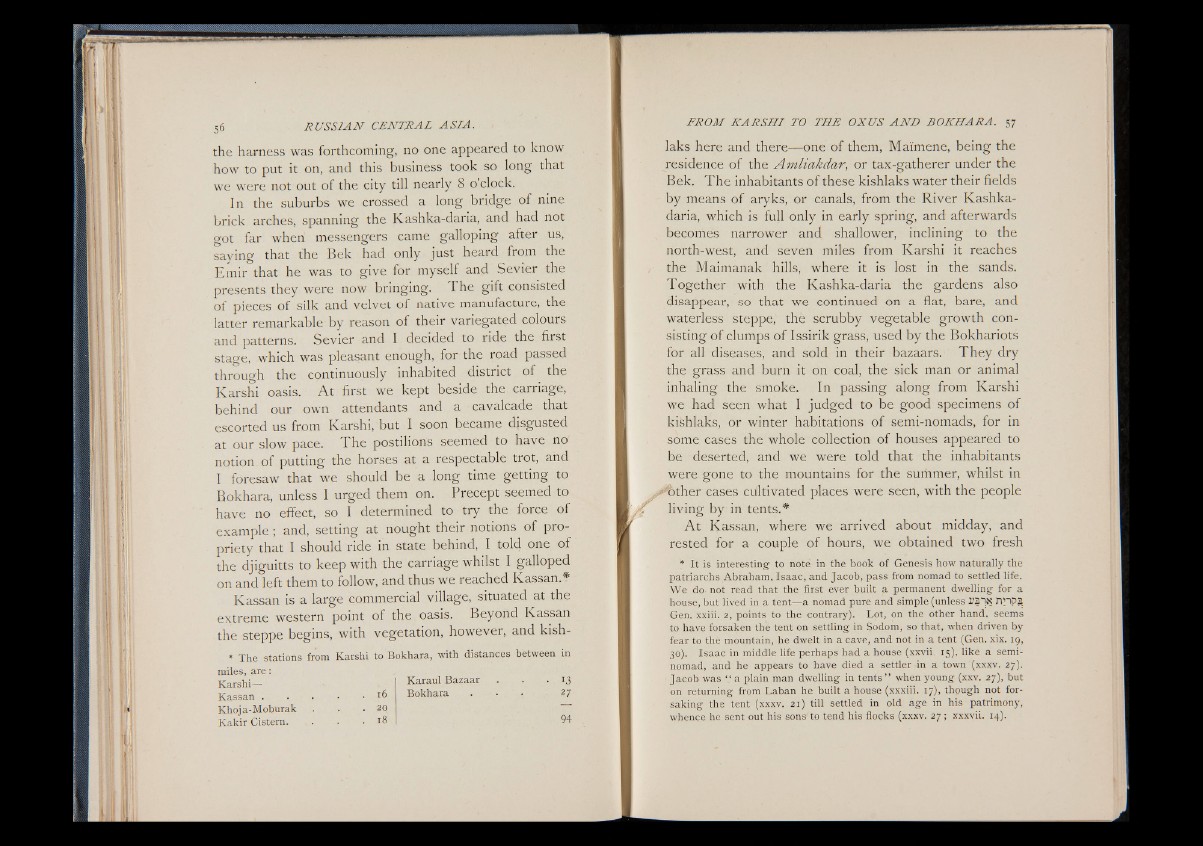
the harness was forthcoming, no one appeared to know
how to put it on, and this business took so long that
we were not out of the city till nearly 8 o’clock.
In the suburbs we crossed a long bridge of nine
brick arches, spanning the Kashka-daria, and had not
got far when messengers came galloping after us,
saying that the Bek had only just heard from the
Emir that he was to give for myself and Sevier the
presents they were now bringing. The gift consisted
of pieces of silk and velvet of native manufacture, the
latter remarkable by reason of their variegated colours
and patterns. Sevier and I decided to ride the first
stage, which was pleasant enough, for the road passed
through the continuously inhabited district of the
Karshi oasis. A t first we kept beside the carriage,
behind our own attendants and a cavalcade that
escorted us from Karshi, but I soon became disgusted
at our slow pace. The postilions seemed to have no
notion, of putting the horses at a respectable trot, and
I foresaw that we should be a long time getting to
Bokhara, unless I urged them on. Precept seemed to
have no effect, so I determined to try the force of
example ; and, setting at nought their notions of propriety
that I should ride in state behind, I told one of
the djiguitts to keep with the carriage whilst I galloped
on and left them to follow, and thus we reached Kassan.*
Kassan is a large commercial village, situated at the
extreme western point of the oasis. Beyond Kassan
the steppe begins, with vegetation, however, and kish-
* The stations from Karshi to Bokhara, with distances between in
miles, are:
Karshi—
Karaul Bazaar . . . 13
Kassan . . . . • 16
Bokhara . . . 2 7
Khoja-Moburak . . . 2 0
Kakir Cistern. . . . 18-
94
laks here and there— one of them, Maimene, being the
residence of the Amliakdar, or tax-gatherer under the
Bek. The inhabitants of these kishlaks water their fields
by means of aryks, or canals, from the River Kashka-
daria, which is full only in early spring, and afterwards
becomes narrower and shallower, inclining to the
north-west, and seven miles from Karshi it reaches
the Maimanak hills, where it is lost in the sands.
Together with the Kashka-daria the gardens also
disappear, so that we continued on a flat, bare, and
waterless steppe, thè scrubby vegetable growth consisting
of clumps of Issirik grass, used by the Bokhariots
for all diseases, and sold in their bazaars. T hey dry
the grass and burn it on coal, the sick man or animal
inhaling the smoke. In passing along from Karshi
we had seen what I judged to be good specimens of
kishlaks, or winter habitations of semi-nomads, for in
some cases the whole collection of houses appeared to
be deserted, and we were told that the inhabitants
were gone to the mountains for the summer, whilst in
Either cases cultivated places were seen, with the people
living by in tents.*
A t Kassan, where we arrived about midday, and
rested for a couple of hours, we obtained two fresh
* It is interesting to note in the book of Genesis how naturally the
patriarchs Abraham, Isaac, and Jacob, pass from nomad to settled life.
We do, not read that the first ever built a permanent dwelling for a
house, but lived in a tent—a nomad pure and simple (unless JVTp2
Gen. xxiii. 2, points to the contrary). Lot, on the other hand, seems
to have forsaken the tent on settling in Sodom, so that, when driven by
fear to thè mountain, he dwelt in a cave, and not in a tent (Gen. xix. 19,
30). Isaac in middle life perhaps had a house (xxvii. 15), like a seminomad,
and he appears to have died a settler in a town (xxxv. 27).
Jacob was a plain man dwelling in tents ” when young (xxv. 27), but
on returning from Laban he built a house (xxxiii. 17), though not forsaking
the tent (xxxv. 21) till settled in old age in his patrimony,
whence he sent out his sons'to tend his flocks (xxxv. 27 ; xxxvii. 14).